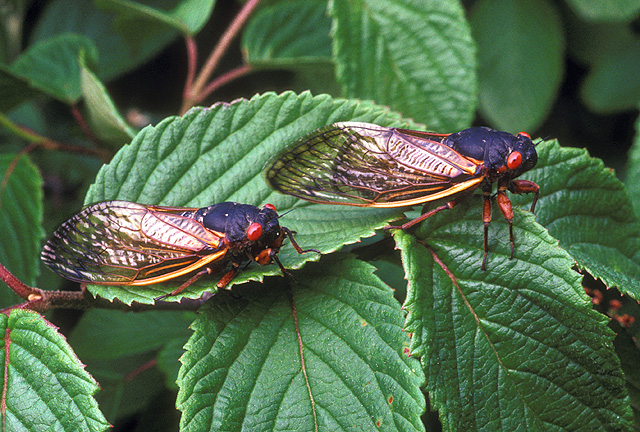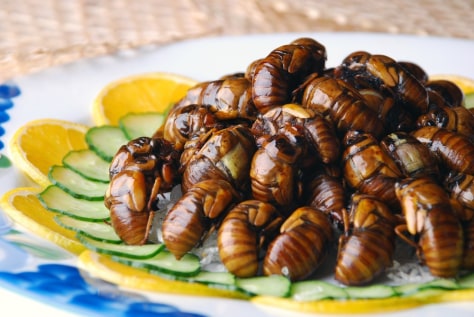General Discussion
Related: Editorials & Other Articles, Issue Forums, Alliance Forums, Region ForumsEverything you need to know about the billions of cicadas that are about to swarm the East Coast.
But climate change may mean it's the last time
The Pilgrims called cicadas “17 year locusts,” because some of them survive for that long underground, sucking the sap from roots, between periodic emergences in epic swarms. Locusts are in the grasshopper family, however and cicadas are garish relatives of spittle bugs and crickets. Beyond that we know precious little about cicadas’ mysterious lives under the earth. And we don’t understand why they wait 17 years between appearances (for some subgroups it’s 13 years, and there are also annuals.) Why 17? Why 13? We also don’t have a clue how these brainless arthropods manage to keep track of the passing years. And how exactly do cicada nymphs know when to all come wiggling out of the soil on cue, emerging within hours of one another after spending over a decade interred?
Most of all, we don’t know why cicadas are diminishing in numbers, their ranges shrinking in many parts of the eastern U.S., or why some historical groups have already become extinct. One thing that scientists are going to do in the weeks ahead, as the huge group, known as Brood 2, emerges from its subterranean haunts from North Carolina to western Massachusetts, is chart the precise location of populations, especially along the fringes of their range. “We need such fine scale mapping,” Cole Gilbert said, “to more directly understand the causes of shrinking distribution.”
How many cicadas are going to come out? Nobody knows for sure. “Billions, maybe more,” Gilbert says. Entomologists have counted as many as a million cicadas per acre during the peak of previous swarms. Emerging in such astronomical numbers may protect individual cicadas from predators– there is just so much that a bird can eat.
The rest: http://www.salon.com/2013/05/03/cicadas_prepare_to_invade_by_the_billions/
-------------------------------------------
I've always had a slight fear of these since I was a child when one dive-bombed me & got caught in my hair. I was probably about 7yrs old and I tried taking it out of my hair and it was freaking out and buzzing loudly. Nightmares.
MineralMan
(146,308 posts)Beautiful, too.
sharp_stick
(14,400 posts)I've never experienced a cicada swarm before, it could be an interesting few weeks trying to convince my bug terrified daughter that they won't hurt her.
redqueen
(115,103 posts)I love the way they look, and the noise they make. Love it.
Tree-Hugger
(3,370 posts)They are absolutely fascinating. Love the noise.
tosh
(4,423 posts)Summer nights just wouldn't be the same without their chorus.![]()
dixiegrrrrl
(60,010 posts)"brainless"????
Are they really "brainless"?
that is an off putting sentence.
randome
(34,845 posts)
Ikonoklast
(23,973 posts)Who knew!
randome
(34,845 posts)geek tragedy
(68,868 posts)Once they get going, you can't hear a damn thing. Just deafening. All day.
IDemo
(16,926 posts)Tinnitus is the cicada swarm that never hibernates.
do I ever "hear" you there! ![]()
redqueen
(115,103 posts)I had that temporarily one time. Thought I was losing it. ![]()
I also have the ringing. Sadly, that one isn't temporary. Damn rock concerts.
IDemo
(16,926 posts)Think of the mike squeals you doubtlessly heard at more than one concert, only at much higher frequency.
redqueen
(115,103 posts)hope it's not too loud. Mine is like the high frequency hum of the transformer in a tv.
alfredo
(60,071 posts)madokie
(51,076 posts)listening to them now LOL
sounds exactly like them too
Jazzgirl
(3,744 posts)So the swarming wouldn't bother me (if I even heard it). Sometimes the swarming in my ears gets so loud it sounds like a train. It has actually awakened me in the middle of the night.
Buns_of_Fire
(17,175 posts)I thought it was cicadas, too. I kept asking people, "Do you hear that?" Every time they'd reply "Hear what?" I figured it was all over and I was descending into insanity.
Finally, I realized it was tinnitus (or brain-eating cicadas, take your pick), and it's been with me ever since. Too many years of standing in front of an amplifier and/or listening to mind-rotting rock 'n' roll music played at earbleed volume, I guess.
After a couple of years, I got used to it. Now, if it went away, I don't know how I'd handle the silence.
Tree-Hugger
(3,370 posts)I mainly have a low roar/static sound.
randome
(34,845 posts)It's at least a possibility, right? ![]()
That struck my funny bone!
[font color="navy" face="Verdana"]For many years now.
I've learned to live with it and it's only done relatively minor damage to my hearing in certain pitch ranges, but I thought I was losing my mind the first few years.
For those of you who don't have tinnitus, just go somewhere that has lots of cicadas.
alfredo
(60,071 posts)alfredo
(60,071 posts)tinnitus and/or hearing loss, head down to the VA. It helps if you have buddies in the same unit/MOS who also have the same symptoms who are willing to write about their struggles with the same issues.
I am now receiving a small payment each month in compensation for my injury.
I was a morse intercept operator and was exposed to loud noises 8-16 hours a day for 3 years, not counting the year in school.
redqueen
(115,103 posts)I love that noise, but if it was just steady instead of waxing and waning it would just be annoying.
geek tragedy
(68,868 posts)continuing until about 4:00 in the afternoon. Very brief respites.
What happens is that some get activated by sunlight hitting them, they go off, and then the entire forest goes off.
Too much of a good thing can be a really bad thing.
We once lost a chance to spot on the coolest birds in Central America (see below) because the cicadas made it impossible to determine where his song was coming from
http://en.wikipedia.org/wiki/Three-wattled_Bellbird
flamingdem
(39,313 posts)and an excellent waddle
geek tragedy
(68,868 posts)a couple years later.
Otherwise there would have been some real angst.
redqueen
(115,103 posts)Sorry about the missed Bellbird sighting. I wonder if it was feasting on the noisy things.
geek tragedy
(68,868 posts)But that's a big bug for a bird to eat.
We did see one in 2011, so it's all good.
mike_c
(36,281 posts)geek tragedy
(68,868 posts)longship
(40,416 posts)So is 13, for the 13 year variety.
That means less competition because they only have to compete with those other 17 year cicadas. Or something to that effect...
Can't exactly remember how it works out, but that's the idea.
Maybe I should Google it...
![]()
redqueen
(115,103 posts)freshwest
(53,661 posts)
The only sound I miss more is the call of meadowlarks in the morning and mourning doves in the afternoon.
alterfurz
(2,474 posts)...used to be so many here in the city, but our burgeoning urban hawk population has decimated and/or scared them off-?
Love your "love this thread" graphic!

freshwest
(53,661 posts)And I think the hawks have eaten many, but it's habitat loss as well. Very little songbirds where I live now, just the sound of seagulls, crows and the occassional pigeon. Songbirds would be an easy meal since they're smaller. Glad you enjoyed the picture, I love seeing them in posts, if they're not the kind of ugly things that 'cannot be unseen.' Uff dah!
flamingdem
(39,313 posts)(not)
marions ghost
(19,841 posts)I think cicadas are wonderful! Get a lot of energy from these critters. LOVE em. The sound is a real buzz for the brain. Free and no side effects.
Talk about Ambient.
IDemo
(16,926 posts)Cicada tacos: http://cicadainvasion.blogspot.com/2011/04/if-you-cant-beat-em-eat-em-cicada.html
You go first.
Sissyk
(12,665 posts)One of my favorite things in the spring and summertime is to sleep with the windows open to the sound of the annual cicadas.
HOWEVER (lol), the last thirteen year (I think it was) they would not shut up. Wouldn't stop. Constant 24 hour chirping. Worse than an earworm. You could hear them FROM IN THE HOUSE with the air on and the windows closed.
It was interesting driving down the interstate. It was like a black snow storm (lol)!. Hitting the windshield, air diving over the top. Sorta like running an obstacle course. When they started dying off, the inside shoulder of the interstate up against the parapet was FILLED with carcases.
Love the annuals though but I think I'm going out of town on a long vacation if they come to Tennessee. haha!
Liberal Veteran
(22,239 posts)IDemo
(16,926 posts)randome
(34,845 posts)ohheckyeah
(9,314 posts)It was just a small area in southwest Virginia that had them.
phylny
(8,380 posts)Bedford County/Smith Mountain Lake. The sound was really freaky loud
ohheckyeah
(9,314 posts)mike_c
(36,281 posts)Just a sampling from the excerpt--
While cicadas ARE in the same suborder as spittle bugs, they are not related to crickets, which belong to the same order as grasshoppers, so it's ironic that the article takes pains to point out that cicadas are not locusts, then relates them to animals that are relatively closely related to locusts.
Why wait so long between brood emergences? It's not so much a question of nymphal duration as it is one of timing. All cicadas have long development times. One of the reasons is that they specialize in an exceedingly low quality nutritional resource-- xylem sap, which is mostly water-- in exchange for cryptic subterranean nymphal habitat, which conveys protection from predators. The main difference between annual and periodic broods is the synchrony of periodical brood emergence. In annual populations, some individuals complete their lengthy development every year and emerge as adults. In periodical populations, those lengthy nymphal development intervals are synchronized so that cohorts emerge during the same year. Places with periodical broods usually have "annual" broods as well, whose population cycles are out of synchrony with the periodical brood, so there are cicadas present every year-- their numbers just peak spectacularly during the periodical emergences.
Natural selection seems to favor both reproductive strategies. Annual populations foster constant pressure on resources, such as nymphal food and adult egg laying sites (adults feed relatively lightly during their short adult instar), fitting the year to year pressure on those resources more closely to their resource renewal rates. However, annual populations have lower overall adult density during any given summer, making mate location more difficult and increasing the per capita predation risk. Cicada's are juicy, rich prey items for other arthropods and for vertebrates such as birds and small mammals.
Periodical broods circumvent some of these problems by synchronizing adult emergence. That insures high population density, which increases mating success and overwhelms predator responses to increased prey density, lowering the per capita risk of predation even while predators satiate themselves on fat, juicy cicadas. The long nymphal development time between periodical brood emergences-- 13 year and 17 year cycles-- prevents predators from likewise synchronizing their life cycles with brood emergences, preventing them from "anticipating" regular bursts of cicada goodness. As someone mentioned up thread, 17 and 13 are prime numbers, so predators cannot synchronize with them across generations.
on edit-- the pic looks more like an annual Tibicen species than a periodical Magicacada species. Just guessing, though.
mitchtv
(17,718 posts)cause it seems like they show up around here every season
MichaelSoE
(1,576 posts)
loli phabay
(5,580 posts)Could be a boon if theres billions of them.
mike_c
(36,281 posts)...but like all adult insects they're annoyingly crunchy, like that crunchy bit in popcorn that always sticks between your teeth. Chitin is the reason we peel shrimp. It's edible, although indigestible, but tough and chewy.
A plate of nymphs:

Cicada satay:

loli phabay
(5,580 posts)If there are billions of them it will be a shame to let them go to waste.
Animal Chin
(175 posts)Is that they bring the Cicada Killer Wasp:
[img] [/img]
[/img]
When we got a family of these things living in our front yard years ago, we all (me, wife, young kids) all got freaked out. They were huge, almost 2 inches long, and VERY aggressive. After researching them on the net, I found out they are actually totally harmless and very fascinating creatures.
A group usually consists of one Queen and several male drones. The Queen digs a burrow and the males protect it. What is interesting is that the main defense (and offense) of the males is that they are aggressive and look like "real" wasps. In reality, the males have no stingers! They will come at you like crazy and have you running back inside for your life. However, they are totally harmless. Eventually, I mustered the nerve to let one land on me, and soon even the kids were doing it.
The Queen meanwhile, has a stinger, although she is very unlikely to use it on anything other than a cicada. Her stinger has a poison (harmless to humans) that paralyzes the cicada. She hunts the cicada, stings it and carries it back to the burrow. This is truly a sight to see, as the cicada is often larger than the Queen.
[img] [/img]
[/img]
Once in the burrow (this is my favorite part), the Queen lays her eggs inside the paralyzed cicada. Then she and the drones go off to die. When the eggs hatch, their first meal is the paralyzed, still living cicada! EEEEWWW!! In the spring/summer, once the cicadas arrive, they emerge from the burrow and the cycle repeats.
Always one of the highlights of my summer!
mike_c
(36,281 posts)Watching them attack and then carry adult cicadas is impressive!
randome
(34,845 posts)Or is it just 'Okay, you got yours queen. See you on the other side.'
angel823
(409 posts)We get the annual cicadas here (Texas), and when I was working in the yard last summer I saw the queen carrying a cicada - you are correct, it is very impressive.
I had to look it up - googled "cicada killer" and this lovely wasp came up. Nature is the coolest!
Angel in Texas
AverageJoe90
(10,745 posts)Schiffman should've left out his first sentence. Very misleading.....
maxsolomon
(33,345 posts)when one flew behind my glasses when I was at the top of a slide.
Now I live on the West Coast and have LASIK-corrected eyes.
It's not a coincidence.
Tien1985
(920 posts)I grew up on Long Island in NY so they weren't much of a nuisance. The sound is the epitome of a lazy summer day for me.